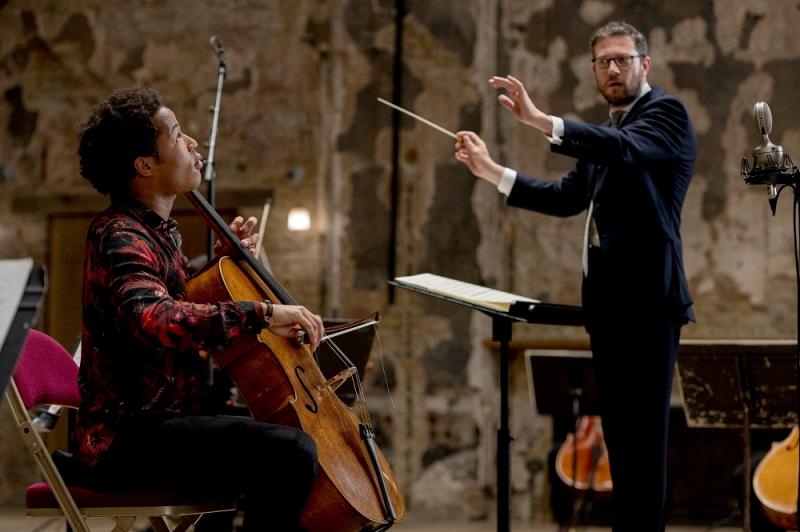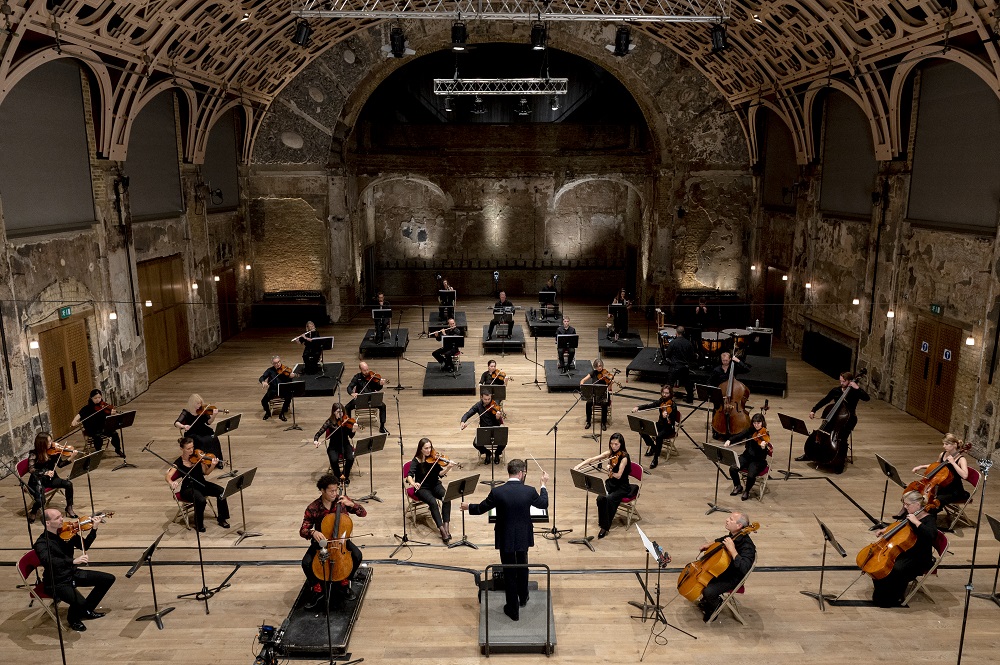Kanneh-Mason, Philharmonia, Wilson online review - light in darkness | reviews, news & interviews
Kanneh-Mason, Philharmonia, Wilson online review - light in darkness
Kanneh-Mason, Philharmonia, Wilson online review - light in darkness
With starry soloist and sky-high production standards, this is a sure-fire winner

Presenting online concerts has been a Matterhorn-steep learning curve for the music sector. Now, after a few months in which imaginations have been tested to the limit, it’s becoming clear what works and what doesn’t.
I’ve been rather resistant to online orchestral concerts, because I miss the real thing like an amputated limb. Still, the level of excellence that came bowling out of my computer this time has just about changed my mind. Initially, seeing a smallish orchestra with players spaced wide apart had me wondering how the ensemble would work. Answer: extremely well, with a beefy, rich, unified orchestral tone rising around the shabby-chic interior of Battersea Arts Centre (BAC). Do the players possibly have more room to let rip without being squeezed up together as if on a rush-hour bus? The brief interval offered interviews with, among others, the sound recordist, who revealed that the situation produces, as unexpected side-effect, a more spacious sound.
Kanneh-Mason brought a light-filled, luminous tone to the Saint-Saëns concerto's twinkle-toed virtuosity, beautifully balancing its drive and vigour with moments of radiant lyricism. The French composer’s sound is unique, evoking worlds sometimes balletic, other times operatic, and John Wilson’s conducting was alive to both sides, keeping the drive and fizz zipping along irresistibly, while giving the soloist ample room to shine. The one real casualty of the situation was Saint-Saëns’ orchestration. With the three-metre separation rule for wind and brass instruments, some of the orchestral parts, notably the second woodwinds, unfortunately disappeared altogether. Wilson made it work nonetheless.  As for the Vaughan Williams Tallis Fantasia, it’s the perfect piece for the occasion: it happens to include a socially-distanced sub-group of players as part and parcel of its scoring, and at its world premiere (in Gloucester Cathedral in 1910) the audience kept silent because of the ecclesiastical setting. Therefore the most uncomfortable thing about lockdown music - the lack of applause - could almost feel like an evocation of something vaguely “authentic”.
As for the Vaughan Williams Tallis Fantasia, it’s the perfect piece for the occasion: it happens to include a socially-distanced sub-group of players as part and parcel of its scoring, and at its world premiere (in Gloucester Cathedral in 1910) the audience kept silent because of the ecclesiastical setting. Therefore the most uncomfortable thing about lockdown music - the lack of applause - could almost feel like an evocation of something vaguely “authentic”.
Still, it looks as if the Philharmonia has struck gold with its format. It has partnered up with Classic FM for this series, so you can watch it on the radio station’s Facebook page, the orchestra’s website, or BAC's Youtube channel, and there’s a live chat facility should you want it. Watching the numbers tick upwards and the viewers clock in, it can be inspiring to see wave-emojis ping up from Brazil, Canada, Los Angeles and more as the world suddenly tunes in to south-west London. The quality of filming and the recorded sound were absolutely superb - other orchestras should note that you can’t cut corners on such things - and the characterful surroundings of the BAC added visual atmosphere galore. With starry soloist, conductor and repertoire cannily chosen and sky-high standards all round, this was a sure-fire winner, for audience and performers alike. We can look forward to two more in the series (22 August and 17 September).
Most importantly, however, all these musicians were audibly and visibly playing their hearts out, having not performed together in months. Their performance showed how much music matters: it is not just a consumer commodity, or a post-work snoozefest, or a place to be seen, but medicine for the soul. The Philharmonia’s interim managing director, Michael Fuller, commented that the orchestra hopes it will bring “some measure of comfort and healing”. If this grim year makes us recalibrate our attitudes to live music and appreciate its role in our existence to the degree it deserves, that can indeed extrapolate some good from the gloom. If the situation continues, meanwhile, they really should make us pay for tickets.
rating
Explore topics
Share this article
The future of Arts Journalism
You can stop theartsdesk.com closing!
We urgently need financing to survive. Our fundraising drive has thus far raised £49,000 but we need to reach £100,000 or we will be forced to close. Please contribute here: https://gofund.me/c3f6033d
And if you can forward this information to anyone who might assist, we’d be grateful.

Subscribe to theartsdesk.com
Thank you for continuing to read our work on theartsdesk.com. For unlimited access to every article in its entirety, including our archive of more than 15,000 pieces, we're asking for £5 per month or £40 per year. We feel it's a very good deal, and hope you do too.
To take a subscription now simply click here.
And if you're looking for that extra gift for a friend or family member, why not treat them to a theartsdesk.com gift subscription?
more Classical music
 Classical CDs: Hamlet, harps and haiku
Epic romantic symphonies, unaccompanied choral music and a bold string quartet's response to rising sea levels
Classical CDs: Hamlet, harps and haiku
Epic romantic symphonies, unaccompanied choral music and a bold string quartet's response to rising sea levels
 Kolesnikov, Tsoy / Liu, NCPA Orchestra, Chung, Edinburgh International Festival 2025 review - transfigured playing and heavenly desire
Three star pianists work wonders, and an orchestra dazzles, at least on the surface
Kolesnikov, Tsoy / Liu, NCPA Orchestra, Chung, Edinburgh International Festival 2025 review - transfigured playing and heavenly desire
Three star pianists work wonders, and an orchestra dazzles, at least on the surface
 BBC Proms: Láng, Cser, Budapest Festival Orchestra, Ivan Fischer review - idiomatic inflections
Bartók’s heart of darkness follows Beethoven’s dancing light
BBC Proms: Láng, Cser, Budapest Festival Orchestra, Ivan Fischer review - idiomatic inflections
Bartók’s heart of darkness follows Beethoven’s dancing light
 Weilerstein, NYO2, Payare / Dueñas, Malofeev, Edinburgh International Festival 2025 review - youthful energy and emotional intensity
Big-boned Prokofiev and Shostakovich, cacophonous López, plus intense violin/piano duo
Weilerstein, NYO2, Payare / Dueñas, Malofeev, Edinburgh International Festival 2025 review - youthful energy and emotional intensity
Big-boned Prokofiev and Shostakovich, cacophonous López, plus intense violin/piano duo
 theartsdesk at the Three Choirs Festival - Passion in the Cathedral
Cantatas new and old, slate quarries to Calvary
theartsdesk at the Three Choirs Festival - Passion in the Cathedral
Cantatas new and old, slate quarries to Calvary
 BBC Proms: Estonian Philharmonic Chamber Choir, Kaljuste review - Arvo Pärt 90th birthday tribute
Stillness and contemplation characterise this well sung late-nighter
BBC Proms: Estonian Philharmonic Chamber Choir, Kaljuste review - Arvo Pärt 90th birthday tribute
Stillness and contemplation characterise this well sung late-nighter
 BBC Proms: Kholodenko, BBCNOW, Otaka review - exhilarating Lutosławski, underwhelming Rachmaninov
Polish composers to the fore in veteran conductor’s farewell
BBC Proms: Kholodenko, BBCNOW, Otaka review - exhilarating Lutosławski, underwhelming Rachmaninov
Polish composers to the fore in veteran conductor’s farewell
 theartsdesk at the Pärnu Music Festival 2025 - Arvo Pärt at 90 flanked by lightness and warmth
Paavo Järvi’s Estonian Festival Orchestra still casts its familiar spell
theartsdesk at the Pärnu Music Festival 2025 - Arvo Pärt at 90 flanked by lightness and warmth
Paavo Järvi’s Estonian Festival Orchestra still casts its familiar spell
 BBC Proms: Batsashvili, BBC Scottish Symphony Orchestra, Ryan Wigglesworth review - grief and glory
Subdued Mozart yields to blazing Bruckner
BBC Proms: Batsashvili, BBC Scottish Symphony Orchestra, Ryan Wigglesworth review - grief and glory
Subdued Mozart yields to blazing Bruckner
 Classical CDs: Hens, Hamburg and handmaids
An unsung French conductor boxed up, plus Argentinian string quartets and baroque keyboard music
Classical CDs: Hens, Hamburg and handmaids
An unsung French conductor boxed up, plus Argentinian string quartets and baroque keyboard music
 BBC Proms: McCarthy, Bournemouth SO, Wigglesworth review - spring-heeled variety
A Ravel concerto and a Walton symphony with depth but huge entertainment value
BBC Proms: McCarthy, Bournemouth SO, Wigglesworth review - spring-heeled variety
A Ravel concerto and a Walton symphony with depth but huge entertainment value
 BBC Proms: First Night, Batiashvili, BBCSO, Oramo review - glorious Vaughan Williams
Spirited festival opener is crowned with little-heard choral epic
BBC Proms: First Night, Batiashvili, BBCSO, Oramo review - glorious Vaughan Williams
Spirited festival opener is crowned with little-heard choral epic

Add comment